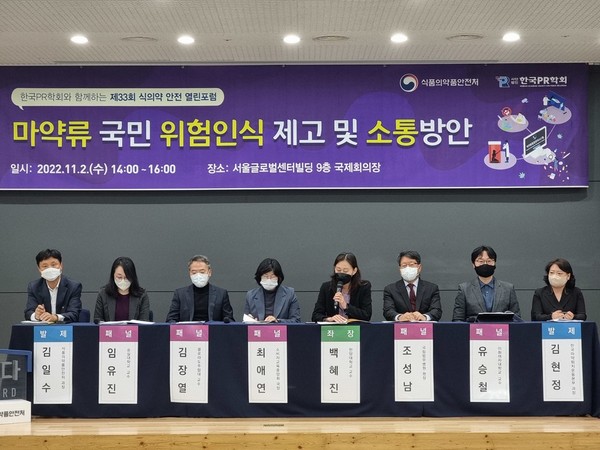“We need to educate medical professionals about the dangers of drug addiction. It’s because doctors sometimes don't know much about the dangers of drug addiction. Now is the time for medical personnel to wake up and understand the medical narcotics issues."
National Law Hospital Director Cho Seong-nam said so while commenting on the issue of medical narcotics in the 33rd Food and Drug Safety Open Forum at the Seoul Global Center Building Wednesday.

“As you saw in the news, there are cases where have prescribed a huge amount of psychotropic drugs,” Cho said concerning the addition to medical narcotics that recently emerged as a social problem.“Medical professionals tend to prescribe appetite suppressants, or "diet pills," sleeping pills, and sedatives to patients quite easily.”
He added that monitoring the prescriptions of medical narcotics is important, but crackdowns and punishments will sometimes be needed.
Cho also pointed out problems in the Narcotics Integrated Management System (NIMS).
“The health authorities run the NIMS, but its utilization rate is very low. This is because you have to access the system separately while treating patients. It's quite uncomfortable," Cho noted. “The authorities should make it possible for doctors to check it immediately in the medical field, as is the case of DUR (Drug Utilization Review).”
In the forum held by the Ministry of Food and Drug Safety, two ministry officials made presentations: Kim Il-soo, director of the Narcotics Policy Division, talked about “measures to strengthen drug safety management according to changed drug management paradigm, and Kim Hyon-jeong, a director in the Korea Anti-Narcotics Movement Headquarters’ prevention project team talked about the "status of public communication to eradicate illegal drug use and prevent their misuse."
“Korea is the world`s largest importer of appetite suppressant ingredients. . Therefore, the government has strengthened the management of manufacturing and importing appetite suppressants since 2020. As part of the control, the government is restricting new permits for drugs containing amfepramone and mazindol ingredients,” Director Kim Il-soo said while introducing the ministry’s policy to control appetite suppressants.
The government is working out policies that bother and worry pharmaceutical companies that market appetite suppressants by, for instance, designating appetite suppressants as the medicine that requires the submission of risk management plans in August last year, Kim added.
Besides, the government is conducting a sewage dynamics-based drug usage monitoring study to investigate narcotics use patterns. It is a method to take samples from sewage treatment plants to analyze the types and amounts of residual narcotics and estimate the amount of narcotics used relative to the population by considering the sewage flow rate, the number of people in the sewage collection area, and the metabolic rate of the human body.
“The monitoring study has entered its third year now. We did not disclose exact numbers and areas, considering the issue's sensitivity. However, the government is preparing to make a more transparent disclosure for the public next year,” Kim said.
The distribution of narcotics on the internet, such as social media, is serious, but it is not clear which ministry is in charge of cracking down on them, Kim pointed out.
“As there are concerns that we cannot prevent the distribution of drugs without blocking them on the internet, I think we should create an agency that can oversee this," he added.
Hong Hyun-woo, director-general for the ministry’s narcotics safety planning, said, “We need to reduce demand for narcotics. A policy that brings addicts back to society as soon as possible is important. There is a drug program to help addicts kick their habit, but a program to restore their social relations is also necessary. The ministry will make such policy efforts."

